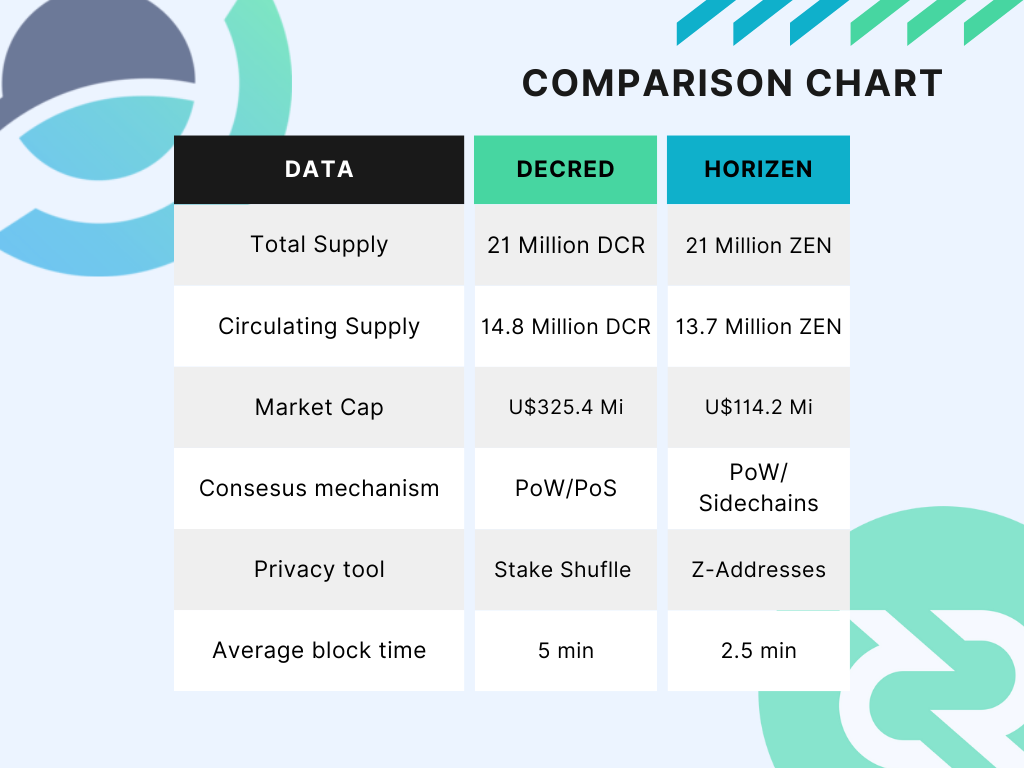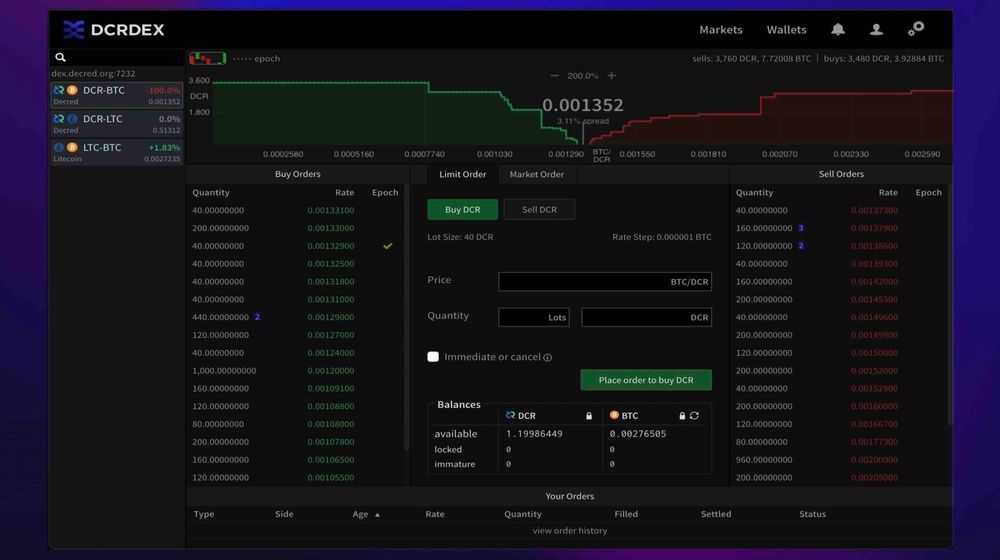Horizen is an interoperable blockchain ecosystem, with a decentralized multi-tiered node infrastructure. The project's mission is to provide data integrity and privacy freedom
Cryptocurrencies are part of the vast universe created by blockchain technology, which has revolutionized the financial system and money transactions. This technology consists of a decentralized and immutable ledger that records and verifies transactions on multiple computers or nodes. You can think of it as a chain of blocks, linked in chronological order containing each a list of transactions.
Many projects go beyond cryptocurrency technology, offering many applications to its blockchain other than the traditional coins. Two examples of networks that aim to create a robust and versatile blockchain ecosystem are Decred and Horizen.
Horizen is an interoperable blockchain ecosystem, with a decentralized multi-tiered node infrastructure. The project's mission is to provide data integrity and privacy freedom, creating a trustful platform where business, information, and personal interactions can be conducted transparently. Let's compare Horizen and Decred to check how their platforms go beyond crypto.

Operation
Horizen is a very popular privacy-focused crypto. It is the first transport layer security (TLS) end-to-end encrypted money network. The consensus mechanism adopted is Proof-of-Work, which maximizes security and gives out ZEN through the miners. Despite having PoW as a consensus mechanism Horizen developed the Zendoo protocol, which allows a Bitcoin-based blockchain to operate with any domain-specific blockchain or blockchain-like system. It acts as a bridge that connects Horizen's main blockchain with other blockchains, authorizing the transfer of data and assets.
Zendoo creates sidechains, separate chains parallel to the main blockchain. They have their own specific rules and features, being customizable for different purposes and applications. Developers can build tools and decentralized applications without affecting the main blockchain functioning. Horizen network was built to cater to all forms of consensus mechanisms, believing that innovation is better through the creation of hybrid consensus solutions.

Decred's blockchain revolves around a hybrid Proof-of-Work/Proof-of-Stake consensus mechanism and believes in this solution to improve decentralization and security. Decred is a fork-resistant blockchain network, designed to formalise the occurrence of hard fork upgrades, through its governance mechanisms. Decred's network has a commitment to security, efficiency and balance.
Funding
Horizen founders Rob Viglione and Rolf Versluis learned that it was arduous for the project development to be made only by volunteers. They didn't have money to offer salaries since ZenCash (previous ZEN name) did not offer an Initial Coin Offer (ICO) to raise funds. They thought of a sustainable funding model for ZEN where part of the newly generated coins got directed to the treasury fund. With this treasury implementation, Horizen can pay salaries, attract talent, and finance the project. Currently, 20% of each block reward gets directed to the Horizen Treasury Fund.
Decred also opted for a sustainable manner to finance the project's development and marketing: 10% of each block reward gets directed to the Decred treasury. Every time a community member wants to start a new initiative to improve the project, he can submit a proposal to Decred`s governance platform POLITEIA. A successful proposal needs at least 20% participation and at least 60% "yes" votes, if approved the necessary funds will be available for the person/team to make the initiative happen.
Horizen adopted a proposal system as well. Zen improvement Proposals (ZenIP) are an established mechanism to decide upon new updates and protocol changes. ZenIPs were created to standardize the process of change inside the Horizen project being a key element to transparent governance.
Each ZenIPs starts with an owner proposing by specifying it and creating a pull request on the ZenIP repository. ZenIP editors are responsible to help owners review and merge the pull request if all requirements are met. After the public discussion, Editors need a supermajority to approve the proposal. After the test phases, A ZenIP becomes activated on the Horizen blockchain if it meets the project's quality standards.

Transactions/Privacy
One of the core Horizen features is privacy. Since the beginning, the project used zero-knowledge proofs to make ZEN untraceable between users that seek privacy. ZEN has two types of addresses:
1- T-Addresses: regular addresses similar to Bitcoin or any other crypto where anyone can see all of an account's transaction history.
2- Z-Addresses: The ones containing zero-knowledge proof. When two Z-Addresses trade with each other the privacy is total, transactions remain private, anonymous, and hidden.
The Horizen project is a leader when talking about Nodes. Its network contains over 40.000 active nodes. 3 types of Nodes play different roles inside Horizen's system:
Regular Full Nodes: The ones that are part of networks like Decred and Bitcoin, containing copies of blockchain network data and transactions. A program that fully validates blocks, without relying on a third party.
Secure Nodes: Regular Full Nodes that employ specific enhancements over security, privacy, and integrity of communication between nodes.
Super Nodes: Secure Nodes that enable the network sidechains and platform applications. They provide the required infrastructure to implement SideChaining, transforming Horizen from a pure cryptocurrency to an application with a series of possible services.
Decred network also has privacy as one of its fundamentals. The Stakeshuffle mixing protocol was developed to improve security, users can use this tool to anonymize their addresses and obfuscate the ownership of DCR. Stakeshuffle is available for everyone that downloads Decred's wallet Decrediton.
Decred decentralized exchange DCRDEX is one of the project's greatest features. It has no arbitrary fees, letting only users profit from their transactions, trading coins like Bitcoin, Ethereum, USDC, Litecoin, Digibyte, and Doge.

Communication apps have also been developed by Decred and Horizen, in which users can communicate privately with no fear of censorship. Decred recently launched Bison Relay, a new take on Social Media. The platform offers end-to-end encryption that ensures only the intended recipients see the content of messages, it also makes it possible for users to monetize their content using the built-in-Lighting Network. Horizen developed ZenChat, a decentralized messaging application designed to provide secure communication within the Horizen ecosystem. ZenChat aims to provide an alternative to traditional messaging platforms, where users have control over their data and privacy.
Moving Foward
It's always good to analyze interesting projects like Horizen and compare them to Decred. These are both solid project building a blockchain that goes beyond cryptocurrency and providing many opportunities for applications and tools. Decred and Horizen surely are two initiatives that dive deep into this field, creating interesting innovations for transactions, governance, and communication.
What is the Horizen feature that you found to be interesting? Leave a comment below!






Comments ()